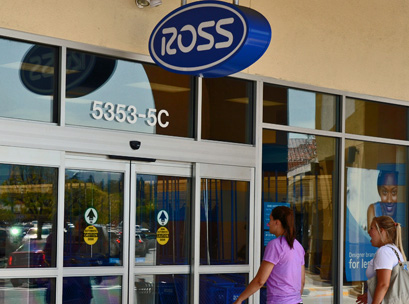There is a sea of red flowing through Australian retail right now.
Walk through any shopping centre and there are red sale posters as far as the eye can see, offering increasingly large and ever more desperate discounts.
But customers just aren’t responding, and so the red is now flowing through to the financials, with retailers such as David Jones flagging an “unprecedented” slump. So, apart from pushing the panic button, what’s a retailer to do?
Part of the answer may lie in what ‘off-price’ US retailer, Ross Dress for Less, calls “the treasure hunt”.
I came across Ross on this year’s Westfield World Retail Study Tour. At first glance it looks like a discount department store for apparel, shoes, accessories and home decor. But the magic is in the buying and merchandising model.
Ross bases its buying teams in the fashion hubs of New York and LA, and negotiates the sharpest possible deals on name-brand merchandise that needs to be cleared for a variety of reasons, for example surplus stock or end of season ranges.
The product is shipped into store daily, priced up to 60 per cent less than department stores, and no two outlets carry the same range. Hence the treasure hunt.
As a customer, you never quite know what you’re going to find.
Ross encourages its customers to shop often, shop early, bring “a buddy” (“another set of eyes increases your chances to spot a bargain”), and “snatch it up” when you spot a deal that’s hot, because it might not be there when you come back.
Rather than just another sale, the treasure hunt becomes an enthralling game where the shopper always wins. And the concept works extremely well in the digital age for a couple of significant reasons.
Firstly, customers are itching to share their finds via social media, which builds buzz, and secondly, they’re unlikely to be able to comparison shop on the web because the items probably won’t be available online. (Ross doesn’t have an e-commerce outlet; it’s all about driving traffic in store).
USA Today recently devoted an entire article to stores finding “success by focusing on the bargain hunt”. As it reported, up to 20 per cent of stock in Costco is limited-quantity merchandise that may be in store for a week or less. In Costco’s case, the treasure hunt strategy has contributed to double-digit comparable store sales increases in the last year.
The trick, according to USA Today, is that retailers not only need to seek out great buys in the first place, but get them in front of the shopper quickly. Fast turnover builds a sense of urgency; “if you don’t buy it today, it probably won’t be here tomorrow”.
There are echoes of other successful retailers in this philosophy – think Zara in fashion, and even Apple in electronics, who carefully control supplies of their latest gadgets.
Whether the treasure hunt is the right concept for you or not, it’s definitely time to question the way you bring your offer to market.
When all else fails… don’t panic, just do something different.
* Jon Bird is CEO of specialist retail marketing agency IdeaWorks (www.ideaworks.com.au), and chairman of Inside Retail. Email jon.bird@ideaworks.com.au. For more retail insights and inspiration, visit www.newretailblog.com.






